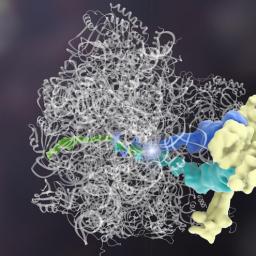Scientists discover the first protein that can edit other proteins
 The most important job inside any cell is making proteins, and they are all made using instructions from DNA. This process is practically gospel in the field of molecular biology, but new research identifies some exceptions. Some proteins, it turns out, can make other proteins.
The most important job inside any cell is making proteins, and they are all made using instructions from DNA. This process is practically gospel in the field of molecular biology, but new research identifies some exceptions. Some proteins, it turns out, can make other proteins.This isn't a case of a protein going rogue. It seems to be part of the recycling process that occurs when there's a mistake in a protein being built. When an error is introduced, the ribosomes stall and call in a group of quality control proteins, including Rqc2. In observing this process, the researchers saw how Rqc2 links up with the transfer RNA and tells it to insert a random sequence of two amino acids into the chain (out of 20 total amino acids).
The researchers believe that Rqc2's seemingly aberrant behavior might be an integral part of keeping your body free of faulty proteins. It's possible that it is flagging the protein for destruction, or that the string of amino acids could be a test to see if the ribosome is working properly. People with disorders like Alzheimers and Huntingtons diseases have defective quality control processes for their proteins. Understanding the exact conditions where Rqc2 is triggered, and where it fails to trigger, are the next step in this research, and could be important for developing new treatments for neurodegenerative diseases.
It's easy enough to approve or reject submissions on my phone when I have just a few minutes to spare, but not nearly so quick and easy to find interesting stories, and write-up a good summary of them, myself, while occupied with other tasks.
Somebody has to come up with the interesting content. I had never submitted anything to the old site, but I figured it out pretty quick once I gave it a try. With a bit of practice anyone can do it, and everyone is welcome to chip-in and try their hand at it. Something to keep in mind while waiting around to see when the next story is going to show-up...